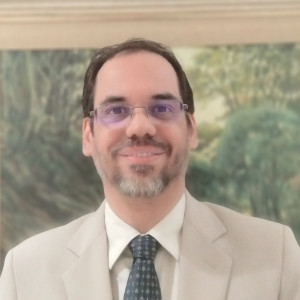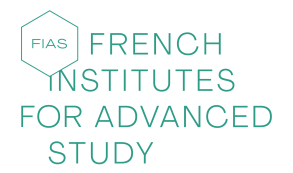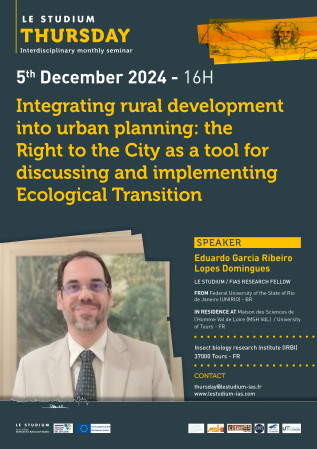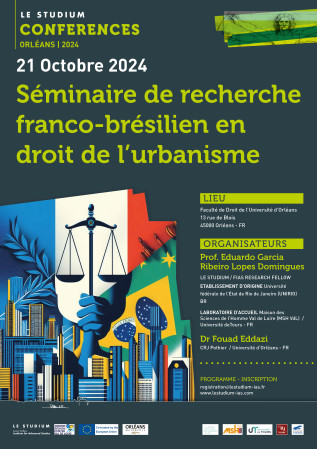Eduardo Garcia Ribeiro Lopes Domingues

From
Federal University of the State of Rio de Janeiro (UNIRIO) - BR
In residence at
Maison des Sciences sociales et des Humanités Val de Loire (MSH VdL) / CNRS, University of Tours, University of Orléans - FR & Cities, Territories, Environment and Societies (CITERES) / CNRS, University of Tours - FR
Host scientist
Romeo Carabelli
BIOGRAPHY
Associated Professor at the Federal University of the State of Rio de Janeiro (UNIRIO) - BR of civil and urban law at Undergraduate Law School and at Master's Degree Program in Law and Public Policies. PhD in City Law from the State University of Rio de Janeiro (UERJ). Consultant in Urban Policy and Urban Law of the Brazilian Institute of Municipal Administration (IBAM). Associate Member of the Brazilian Institute of Urban Law (IBDU).
Eduardo Domingues has 18 years of experience working as a legal assistant in urban plan-making with an interdisciplinary team that aids municipalities in the process of elaborating urban master plans, land use law, and other urban laws toward the implementation of the urban local plan and the City Statute, a national general urban law. The work includes the diagnosis phase, the proposals, and the writing of the bill's drafts. All phases are discussed with the local administration officers and technicians and are followed by public hearings. Recently, his research led him to focus on the question of how rural development can be considered in urban planning and how this can help improve environmental protection.
PROJECT 2 (July > December 2024 ; FIAS Research Fellow)
Rural and urban development integration through democratic territorial planning and environmental concern
his research project expects to strengthen rural and urban development through democratic territorial planning and environmental concern. Our premise is that the integration of rural areas development into democratic urban planning can improve territorial organization and this territorial plan can be optimized through the implementation of environmental protection actions.
We learned that urban land was the opposite of rural land, this one is for production and the first for the distribution of wealth, for scientific production, for the arts. Therefore, we forget (or choose not to see) that the rural environment and the rural way of life are culturally rich in their traditions, and their ethics, in sustainability. Only the large agricultural industries, the timber and mining companies, as well as the large urban construction industries are interested in the division between urban and rural planning. In this way, the needs of small organic farms and urban workers living in poor areas are managed not to be considered.
The integration of urban and rural developments into a territorial plan is not only possible but necessary to help the implementation of the SDGs if we want to overcome the environmental disaster that we, as humankind, brought to planet Earth. The points that bind together rural and urban plannings are the environmental damage and the social iniquity that we cause to sustain modern societies and the urban way of life. Therefore, setting the agenda for nature’s protection and bringing people to discuss rural and urban local development are instruments to achieve a territorial sustainable development plan.
Through the study of urban planning movements, from sanitation measures to zoning rules, smart cities, and bike-friendly cities we can discuss Lefebvre’s “right to the city” and Castells’ “urban question”; through the study of nature’s legal personality and environmental protection instruments, it’s possible to ask if we are doing enough to protect the environment and, therefore, to protect humans as well.
Applying the methods of bibliographic review, survey research of territorial plans, and study case of the Loire Valley Parliament, the project aims to analyze, both in France and in Brazil, the integration of the development of rural areas into democratic urban planning, seeking to reveal the strengths and weaknesses of these plans, as well as to point out their needs and possibilities of transformation and integration with rural development. A democratic participation process is a form of policy-making and decision-making, understanding this process, and its effects on the Science of Law and the community is important to pursue general principles that may be of help for spreading practices on integration of rural and urban development into territorial planning through environmental protection.
More than preparing cities, Covid-19 showed us that we need to prepare societies to face the biggest threat of all, the modern way of life.
PROJECT 1 (January -> June 2024 ; MSH Val de Loire Visiting Researcher)
Pursuing democratic environmental urban planning: the role of international law, urban and rural integration, and local actions
The research project works with the hypothesis that integrating urban planning with rural development through environmental protection instruments as key principles is a crucial factor for adapting society to a truly and effective sustainable development for all people.
Based on international statements, like 1972’s Stockholm Declaration, 2015’s Sustainable Development Goals, and 2016’s UN-Habitat New Urban Agenda, urban and rural development and environmental protection actions must be combined to help undermine cities’ growth problems and environmental devastation, acting to ensure the “right to the city” to everyone, either living in urban or in rural areas. The Covid-19 pandemic brought sanitary challenges for urbanism, which are not new. The solution of simple adaptation of capitalist cities to face epidemic will only make increase the environmental devastation and the iniquity.
In order to promote “the right to the city”, equal and sustainable, this research seeks to outline possible responses for David Harvey’s question about how democratic participation and local autonomy can be effective in large scale problems without being a way of privatizing the commons.
We’ll study (i) the integration of environmental protection instruments into democratic urban plans and its extension to rural areas; (ii) the role of international organisms and the role of the uprising “international environmental law”; and (iii) the theories about nature’s legal personality as possible a path to integrate democratic urban plans and rural development by strengthening environmental protection.
Through the lens of public policy cycle and with wide interdisciplinarity, we also aim to investigate local protection actions such as the Loire Valley Parliament initiative for environmental protection through the recognition of Loire River legal personality. We seek to outline legal and administrative actions, to indicate possible paths for international technical and financial support to improve environmental protection via local governments urban planning and non-governmental organizations
actions.
| Urban planning and climate change: insights from Eduardo Domingues |



